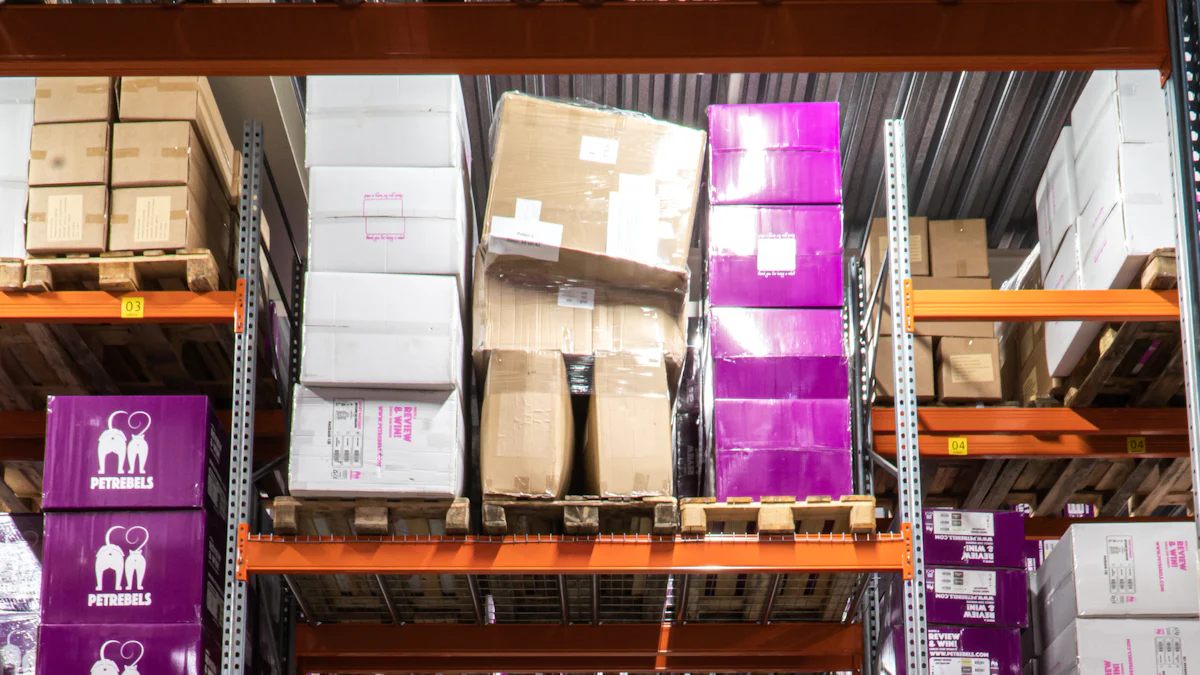Top Supply Chain Solutions for Reducing Costs

Controlling expenses within the supply chain is paramount for businesses aiming to enhance profitability. The strategic management of supply chain solutions can significantly impact overall operational costs and efficiency. This section will delve into key strategies that offer tangible benefits in reducing expenses while optimizing the flow of goods and information.
Implementing Technology Solutions

Automation and Robotics
Implementing automation in warehousing operations can revolutionize efficiency by reducing manual labor and increasing productivity. By utilizing robotics, companies can streamline processes, minimize errors, and enhance overall operational speed. A prime example of this successful implementation is seen in a major retailer where robotic systems optimized inventory management, leading to substantial cost savings.
Internet of Things (IoT)
The integration of the Internet of Things (IoT) offers real-time insights into supply chain operations, enabling proactive decision-making based on accurate data. Through IoT devices, businesses can track shipments, monitor inventory levels, and predict maintenance requirements efficiently. This predictive maintenance approach not only reduces downtime but also cuts costs associated with unexpected repairs.
Artificial Intelligence and Machine Learning
Artificial Intelligence (AI) and Machine Learning technologies play a pivotal role in demand forecasting and inventory optimization. By analyzing historical data patterns, AI algorithms can predict future demands with precision, allowing companies to optimize their inventory levels effectively. JusLink's case study exemplifies the transformative impact of AI-driven supply chain enhancements in reducing costs while improving operational performance.
Enhancing Supplier Relationships
Strategic Sourcing
Criteria for Selecting Cost-Effective Suppliers
Establish clear metrics to evaluate supplier performance.
Define value-sharing agreements to align incentives.
Jointly invest in process improvements for mutual benefit.
Long-Term Benefits of Strategic Partnerships
Align metrics: Ensure both parties are working towards shared goals.
Share risks and rewards: Foster a collaborative approach to success.
Invest in innovation: Drive continuous improvement through joint initiatives.
Supplier Collaboration
Joint Cost-Saving Initiatives
Align on cost reduction targets and strategies.
Implement lean practices to streamline operations and eliminate waste.
Share best practices to enhance efficiency across the supply chain.
Case Study: Collaborative Success in Reducing Costs with JUSDA's C2M2C Model
Key Findings
Aligned Metrics: JUSDA and its suppliers established common KPIs for performance evaluation.
Value Sharing: Both parties benefited from cost savings through shared risk-reward mechanisms.
Innovative Solutions: Collaborative projects led to process efficiencies and improved profitability.
By fostering strong relationships with suppliers through strategic sourcing and collaboration, businesses can achieve sustainable cost reductions while driving operational excellence.
Optimizing Inventory Management
Just-In-Time (JIT) Inventory
Reducing holding costs
Minimize storage expenses by implementing a Just-In-Time (JIT) inventory system.
Enhance cost efficiency through timely deliveries that reduce excess stockpiling.
Risks and mitigation strategies
Identify potential risks associated with JIT inventory, such as supply chain disruptions.
Develop contingency plans to mitigate risks and ensure continuous operational flow.
Inventory Turnover Ratio
Importance of high turnover rates
Achieve financial benefits by focusing on maintaining high inventory turnover rates.
Improve cash flow and reduce holding costs through efficient inventory management practices.
Techniques to improve turnover
Implement demand forecasting tools to optimize stock levels.
Utilize data analytics for accurate trend analysis and inventory planning.
Streamline procurement processes to align with demand fluctuations effectively.
Intelligent Warehousing
Benefits of cloud warehouse solutions
Optimize storage capacity utilization with cloud-based warehouse solutions.
Enhance scalability and flexibility in managing inventory through digital platforms.
Real-world examples of Zunshida's intelligent warehousing
"Zunshida's intelligent warehousing exemplifies the future of supply chain management, integrating advanced technologies for seamless operations."
Zunshida's automated systems ensure real-time tracking, reducing manual errors and enhancing overall efficiency.
By leveraging intelligent warehousing, Zunshida has achieved significant cost savings while improving customer satisfaction levels.
Streamlining Logistics and Transportation

Route Optimization
Software Solutions for Efficient Routing
Implementing advanced software solutions can revolutionize route optimization, leading to significant cost savings and operational efficiencies. These tools analyze various factors such as traffic patterns, delivery schedules, and vehicle capacities to determine the most efficient routes.
By utilizing these software solutions, companies can streamline their transportation operations, reduce fuel consumption, and improve delivery times. This proactive approach enhances customer satisfaction while minimizing unnecessary expenses associated with inefficient routing.
Case Study: Cost Savings Through Optimized Routes
AGCO's Freight Cost Reduction Strategy
AGCO successfully reduced freight costs by 18% within a year and a half of implementing a European logistics solution.
The company's focus on route optimization led to improved efficiency in transportation processes, resulting in substantial cost savings.
Key Takeaways
Operational Efficiency: AGCO's optimized routes enhanced overall operational efficiency by reducing transit times and fuel consumption.
Cost Reduction: The implementation of route optimization strategies directly contributed to significant cost reductions in the company's transportation expenditures.
Freight Consolidation
Benefits of Consolidating Shipments
Freight consolidation involves combining multiple shipments into a single load to maximize truck capacity utilization. This practice reduces the number of individual deliveries, leading to lower transportation costs per unit.
By consolidating shipments, businesses can achieve economies of scale, negotiate better freight rates with carriers, and minimize empty space within trucks. These benefits translate into substantial cost savings while maintaining service quality.
Real-World Examples of Successful Freight Consolidation
"Efficient freight consolidation is key to achieving cost-effective transportation solutions."
Companies like AGCO have successfully implemented freight consolidation strategies to optimize their supply chain operations. By consolidating shipments intelligently, these organizations have significantly reduced transportation costs while improving delivery reliability.
By prioritizing route optimization and embracing freight consolidation practices, businesses can enhance their logistics efficiency, reduce operational expenses, and ultimately improve their bottom line.
Implementing budget control techniques is vital for both short-term savings and long-term financial stability in supply chain operations.
Embrace a holistic approach to successful cost reduction strategies, ensuring continuous improvement and adaptation to dynamic market demands.
The future of supply chain management lies in agile methodologies that prioritize efficiency, innovation, and sustainable practices for lasting cost reductions.
See Also
Maximizing Efficiency: Cutting Costs in the Supply Chain
Efficient Fixes for High-Tech Manufacturing's Supply Chain Challenges
Revolutionizing Supply Chain Management with Cloud Solutions
Avoiding Overpayment: Tips to Reduce Supply Chain Costs
Unleashing Efficiency: Insider Tips for Cutting Logistics Costs
